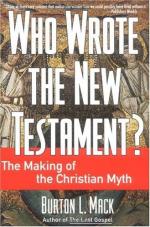
|
| Name: _________________________ | Period: ___________________ |
This test consists of 15 multiple choice questions and 5 short answer questions.
Multiple Choice Questions
1. What is the Jewish story of the persecuted sage also called?
(a) Story of the resurrection.
(b) Story of the wisdom's child.
(c) Story of the Maccabee.
(d) Story of the Cynics.
2. What does Mack believe the figure of Jesus became with the Pronouncement Stories?
(a) A mystic.
(b) A teacher.
(c) A martyr.
(d) Interpreter of the law.
3. What does Mack claim is the reason for the many portrayals of Jesus?
(a) Different groups developed his image to support their movement.
(b) Different groups saw him differently, based on his age.
(c) There is no difference in the portrayals of Jesus.
(d) Different people changed the true description for political gain.
4. Why does Mack claim the Bible was important by the end of the fourth century?
(a) It gave the Church credentials for a role in Constantine's empire.
(b) It gave the Church credentials for a role in Jewish history.
(c) It gave the Church credentials in the eyes of early Christians.
(d) It gave the Church credentials for a role in the history of Israel.
5. What does Paul assure the Thessalonians in terms of "those who had died"?
(a) That those who died with God will live with God.
(b) That those who died with God will never die.
(c) That those who died in sin would not be with God after death.
(d) That those who died before Christ could still be saved.
6. What happened at Corinth that made Paul nervous?
(a) The congregation became a place for criminals.
(b) The congregation became a place for worship of other deities.
(c) The congregation became a place for lies and treachery.
(d) The congregation became a place for extravagant displays of spiritual behavior.
7. What three figures did Paul bring together to combat the concept that the divine spirit was all that mattered?
(a) The individual, Christ, and the congregation.
(b) The heart, mind, and soul.
(c) The individual, Christ, and God.
(d) The mind, body, and soul.
8. What does each of these movements attempt to link Jesus to, according to Mack?
(a) The grand traditions of Israel.
(b) Jerusalem.
(c) The kingdom of God.
(d) The fight against Rome.
9. What does Mack suggest the taking up of residence in Jerusalem signifies for the group?
(a) A religious agenda.
(b) A disrespect for Jewish tradition.
(c) A political agenda.
(d) A loyalty to the Pharisee.
10. When would eternal life be obtained, according the Mack's depiction of Paul's letters to the Thessalonians?
(a) Never.
(b) In accepting Christ.
(c) In death.
(d) At the end of time.
11. What is contained in the Gospel of Thomas?
(a) Stories of the disciples.
(b) Stories of creation.
(c) The myth of the resurrection.
(d) The sayings of Jesus.
12. What does Mack claim was the slogan for Paul's gospel?
(a) Freedom from the law.
(b) Freedom from persecution.
(c) Freedom from exile.
(d) Freedom from sin.
13. What does Mack say the Christ cult laid the foundation for?
(a) The Church.
(b) A distinctly Christian mentality.
(c) A Roman-Christian war.
(d) A battle between the Christ cult and the Jesus movements.
14. Where was Jesus from?
(a) Israel.
(b) Galilee.
(c) Italy.
(d) Greece.
15. Who were the super apostles at Corinth?
(a) Hebrews and Israelites.
(b) Jews and Protestants.
(c) Disciples of Paul.
(d) The Pillars of Jerusalem.
Short Answer Questions
1. Who were the Judaizers?
2. What does Mack claim the Christ hymn was the result of?
3. What did Paul stress was important, since they were "members of Christ"?
4. How did the Christ cult differ form the Jesus movement?
5. What concept was important to the Jewish temple-state, the Greek polis, and the Roman system of government?
|
This section contains 654 words (approx. 3 pages at 300 words per page) |

|




